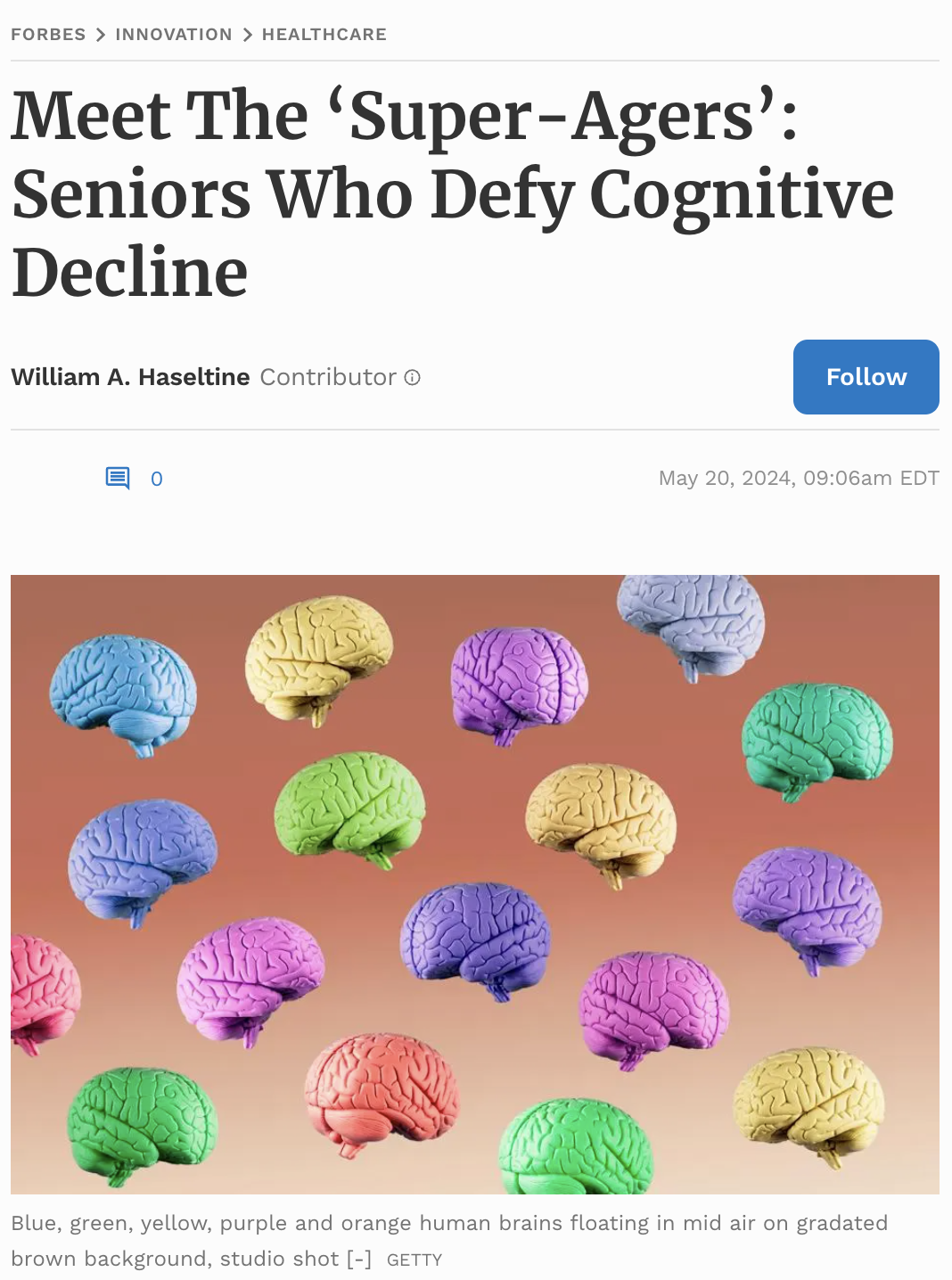It is no secret that cognition begins to decline with age. That one friend’s birthday becomes more and more difficult to remember, and you might start forgetting where you put your glasses or your wallet. Our thinking also begins to slow, occasionally becoming muddled or confused. This is just a natural and inevitable part of growing older.
Or is it?
A new study published in The Journal of Neuroscience confirms that a lucky few, so-called “super-agers,” retain the brain health of someone aged 50 or 60 despite actually being 80 or older. The findings show that such super-agers lose less white matter —a type of brain tissue associated with memory and cognitive sharpness— than others their age.
White Matter: The Highway System of the Brain
Our brains are made up of two main types of tissue: gray matter and white matter. Gray matter often steals the limelight when it comes to discussions and research around cognition. This is not surprising; it is the part of the brain that contains the neurons, making it the control center for complex brain functions like learning, memory, and reasoning.
White matter, on the other hand, sits deeper within the brain. Its primary role is to connect different regions of the brain to one another, like a vast transportation network. It helps carry the electrical impulses that allow neurons to communicate with each other. The same electrical impulses that allow other parts of our body to relay information to neurons, like when you want to move a finger or the pain you feel after stubbing your toe.
Increasingly, we are coming to understand that the brain’s white matter is just as important to cognitive health and function as the gray matter. Without the “highways” that connect them, different sections of the brain cannot properly share information or coordinate functions. The end result is a breakdown of cognition.
Super-Agers Hold Onto Their White Matter
To find out what sets super-agers apart from other older adults, the researchers worked with 119 octogenarians. Of these, 64 were super-agers. The remaining 55 displayed normal memory and reasoning abilities for their age. The team of scientists followed up with the octogenarian volunteers for a span of ten years, during which they had their memory and thinking skills tested, regularly had their blood drawn, and underwent multiple brain scans. The octogenarians were also surveyed about their lifestyle, including questions about their exercise habits, their diets, and their smoking and drinking statuses.
The key difference between super-agers and typical older adults came down to white matter; while the normal adults lost a significant portion of white matter as they aged, the super-agers did not. This was particularly pronounced in the hippocampus and the entorhinal cortex, two regions of the brain closely linked to memory. The super-agers also enjoyed better connectivity between areas in the front of the brain, a site involved in many different parts of cognition.
Importantly, none of the volunteers displayed any signs of Alzheimer’s disease, dismissing the worry that changes in cognition or memory were, in fact, being shaped by the disease.
Can You Become A Super-Ager?
Of course, the question at the tip of everyone’s tongue is, “How do I become a super-ager?” Well, unfortunately it is not an exact science. When looking back at the lifestyle questionnaires, the researcher noticed that there was an unexpectedly large amount of overlap between the habits of super-agers and those of typical older adults. For the most part, the two groups shared similar diets, got similar amounts of sleep, and smoked and drank a similar amount. Even exercise, a key metric of healthy aging, was largely the same between the two groups — although super-agers tended to be more active during middle age, they were no more active in old age than their counterparts.
So, while we would all love a simple 5-step program for becoming super-agers, it seems that it may have more to do with the genetic lottery than with any kind of lifestyle decisions. Indeed, super-agers are likely quite rare; Emily Rogalski, a professor of neurology at the University of Chicago, estimates that fewer than 10% of the patients she sees fall into the super-ager category.
For now, we know that super-agers lose white matter more slowly than most older adults. This explains why they maintain healthy brain function into old age, including sharp memory and quick reasoning. But what remains to be uncovered is why, exactly, super-agers lose white matter more slowly in the first place. In other words, we understand the mechanism of protection, but we do not yet understand which factors decide who is protected.
Still, while lifestyle habits do not seem to play a causal role this time around, there is an abundance of evidence that a healthy life —with lots of physical activity, deep social bonds, and a wholesome diet— helps boost longevity and extend “healthspan,” or the number of years spent in good health.


